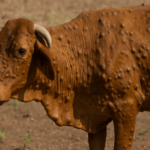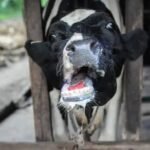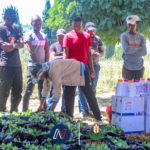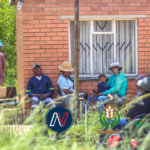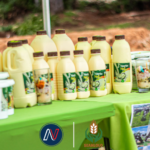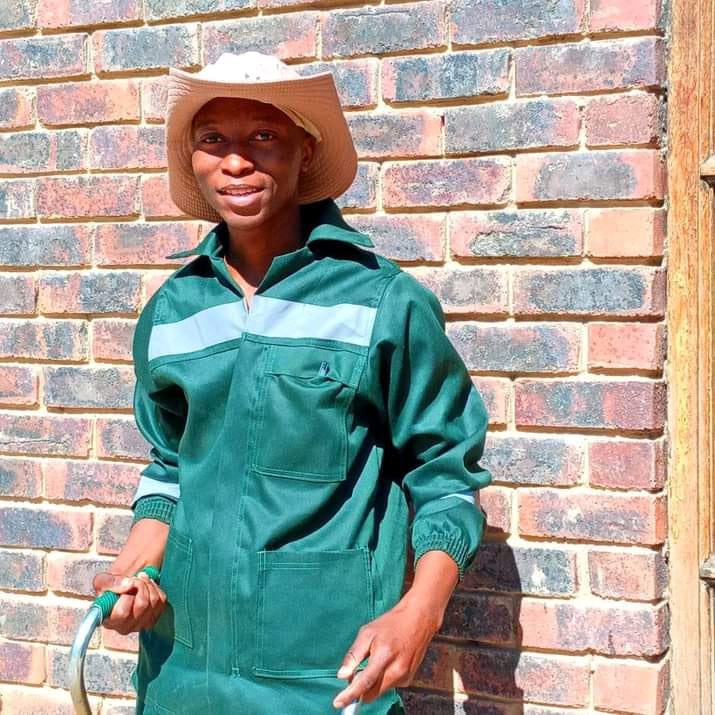By Seabata Mahao
In an era where climate change is no longer a distant forecast but a pressing daily challenge, one young Mosotho is planting more than crops—he is sowing hope, innovation, and resilience across Lesotho’s fields.
Monongoaha Pelei’s journey began in the quiet hills of Mazenod where he was raised in a farming family.
From an early age, he saw first-hand the power of the land, not just as a source of food, but as a means to education, dignity, and opportunity.
Farming paid for his schooling, instilled purpose, and sparked a passion that would grow beyond his wildest dreams.
Now 24 years old, armed with a Diploma in Forestry and Resource Management and a BSc in Crop Science, Pelei is bridging two worlds; the traditional knowledge of his upbringing and the cutting-edge science of modern agriculture.
His story is one of rising from the soil to serve it better.
Back in 2019, while the world struggled with the uncertainty of the COVID-19 pandemic, Pelei quietly launched Farm with Pelei, a consultancy and advocacy platform that equips small-scale farmers with practical, sustainable farming knowledge.
His vision was never just about growing food.
“I wanted to help Basotho farmers, my vision was purely about restoring pride to farming, place tools of knowledge into the hands of rural communities, and build a resilient agricultural future where both women and the youth have an opportunity,” he explains.
With limited resources and unwavering conviction, he narrates that he began offering advice on staple crops like maize and beans, introduced agroforestry techniques, and promoted eco-friendly methods such as intercropping, organic fertilisation, and soil regeneration.
“When things took momentum I then expanded to focus on orchard development, pest management, and post-harvest handling, all critical skills in a time when climate variability threatens every harvest and wreak havoc to Lesotho’s ability to produce food,” the scientist notes.
He points out that across Lesotho, traditional farming practices are under siege.
“Farmers are now forced to confront droughts, hailstorms, and erratic rainfall with soil erosion, low yields, and invasive pests becoming a common norm.”
Pelei is among a growing number of thought leaders urging farmers to adapt to survive.
Through greenhouses, plastic tunnels, and shade nets, he is helping growers protect their crops against extreme weather and maximise their production.
He encourages the use of improved seed varieties and livestock breeds, and promotes catalytic converters for farming machinery to reduce environmental impact.
“At the centre of my work is the promotion of indigenous wisdom and I strongly promote the Machobane Farming System as a sustainable, home-grown solution for farmers of all ages and practices,” he says, speaking boldly about the role of trees in food production.
“Trees are not just shade; they are life,” he says, advocating for soil-binding species such as eucalyptus to combat erosion and promote biodiversity.
His model farm in Maseru serves as a hands-on learning space for farmers.
“I regularly host training through Farmer Field Schools and community workshops and I use my farm as the ultimate school where all things are practicalised,” he says.
He places a special focus on empowering women, whom he calls the backbone of Lesotho’s food security, and continues to break gender barriers by promoting inclusive participation.
Among his most exciting ventures he says is the promotion of hydroponics—soilless farming that uses water to grow crops in controlled environments.
“This system reduces disease, saves space, and uses less water, making it ideal for Lesotho’s changing climate,” he describes, adding that precision farming, where data guides decisions around planting and irrigation, is also on the rise.
“These technologies represent the future of food production—efficient, scalable, and climate-smart,” he notes, adding still, that the road ahead is not without obstacles.
“At the height of farmers problems is their inability to secure markets. Farmers often grow crops without guaranteed buyers, leading to harvest waste and financial losses,” he says noting market access and farmer education go hand in hand.
He believes that agriculture should be seen as a viable career path for young people and not a fall-back plan.
“Farming is not a dead end. It’s a business. A future. We need the youth to believe that, see its potential and convince themselves towards success.”
His call to action extends to entire communities—urging them to support farmers, protect farmland, and participate in agricultural knowledge-sharing.
“Even small farmers matter. If we all eat, then we all depend on agriculture, therefore, supporting our farmers means securing our future and our ability to commercialise what we produce.”
He added, “As the threats of climate change grow more urgent and eminent for Lesotho farmers, solutions must rise from the ground up to influence policy change and hard decisions. We need to start seeing a blend of scientific expertise, grassroots wisdom, and deep personal conviction from the very farmers who are feeling the pinch,” Pelei says.
He adds, “We cannot eat technology or concrete as seen being promoted by the government, and having funds pumped there, but through education and innovation, we can grow our way out of hunger and hardship, blending the very technology to offer agriculture solutions to improve our production as a country.”
His work supports global development goals such as Zero Hunger and Climate Action—but at heart, Pelei’s mission is local, personal, and deeply human.
His purpose is not fame, but impact. “It’s not about being known. It’s about making a difference—in the soil, in our communities, and in the future we are planting.”

